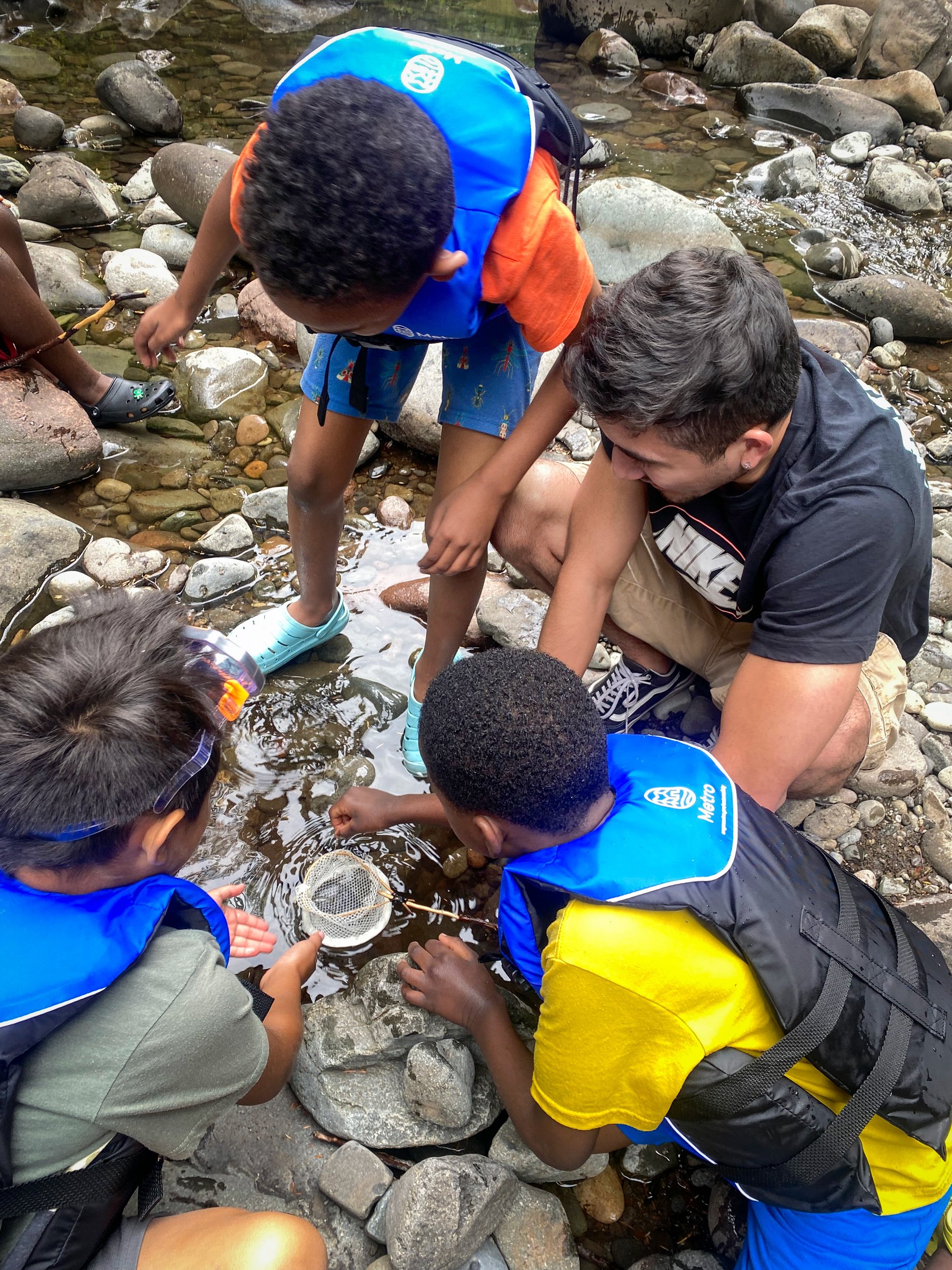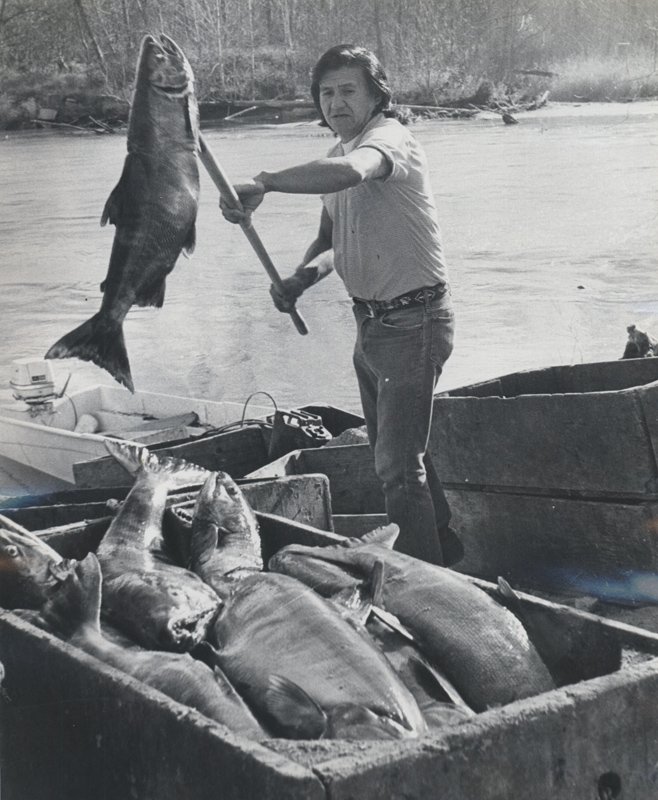Our Team
The Northwest Environmental Justice Center is collaboratively led and driven by a network of diverse partners who bring a wealth of experience, knowledge, and background. Our diversity is our strength.
Our organizational structure is woven from Indigenous values, place-based connections, and relationship building to promote cycles of healing that counter the ongoing damages caused by settlement, displacement, racism, and colonialism. Through a network of state organizers and partners in Alaska, Idaho, Oregon, and Washington, we provide frontline communities with direct technical assistance and support.
Leadership
Collaboration is embodied in the Center’s work and in our leadership model. The Center is led collaboratively by co-directors from PSU’s Institute for Tribal Government and Willamette Partnership. Working together through a co-leadership model, the team has established distinct roles and responsibilities to meet the needs of the Center’s work to uplift the voices and goals of those most impacted by environmental justice issues.
-

Serina Fast Horse
(she/her)
CO-DIRECTORRead Bio
Serina Fast Horse (Lakota & Blackfeet) is a lifelong member and emerging leader of the Indigenous community of Portland. With a foundation of interdisciplinary studies in Community Development and Indigenous Nations Studies, she holds a rounded worldview that prioritizes community-focused and relational approaches. As the owner of Kimimela Consulting, Serina works to cultivate transformative relationships that address social and ecological needs through collaborative relationships between Indigenous communities and regional agencies. She also served as the program coordinator for the Institute for Tribal Government at Portland State University for over three years where she supported the delivery of Tribal relations programming.
She is a gifted communicator and organizer who has been called on to support multiple regional gatherings such as the Changing Currents Tribal Water Summit, Affiliated Tribes of Northwest Indians Climate Camp, and the first Indigenous Land Conservation Summit. Additionally, she serves as a co-chair for the local Native American Community Advisory Council and is a part of the Portland Indian Leaders Roundtable group.
Serina is driven by her passion to embrace Indigenous cultural knowledge and empower Indigenous voices to help create a holistic path to healing our ecological and social communities for our future generations. She looks forward to working collaboratively with her fellow Co-Directors and is excited by the potential impact of the Northwest Environmental Justice Center to create just, equitable, and lasting systemic change for our regional communities.
-

Lynny Brown
(she/her)
CO-DIRECTORRead Bio
Growing up in densely populated Bangkok, Lynny found serenity and healing in the small green space at her apartment complex. The experience of connecting to nature drives her work to advocate for safe and healthy homes, neighborhoods, and communities.
As an environmental public health professional, Lynny provides collaborative leadership, policy expertise, and coordination support for environmental justice initiatives. She works to center community voices while providing the structure needed to keep diverse groups moving forward together.
Lynny has organized for tenants' rights, supported local water justice movements, and advocated for children’s environmental health. She is an alumna of the Asian Pacific American Network of Oregon (APANO)’s Climate, Health, and Housing Institute and joins a strong cohort of community leaders organizing for systemic change to address the root causes of environmental justice issues.
-

Tyler Wagner
(he/him)
COMMUNITY ENERGY SOLUTIONSRead Bio
With a background in environmental sciences and nonprofit management, Tyler comes to the Northwest Environmental Justice Center after leading social justice education focused on local and national issues. Tyler works best in collaborative teams, and as a team member of the Northwest Environmental Justice Center, he is centering on problem-solving and listening to diverse perspectives at the heart of this work. Through his energy and environmental justice lens, he’s building trusting relationships with communities through conversations to guide and support them through the Center’s technical assistance.
In this role, Tyler will be supporting the Co-Directors in carrying out the work of the Northwest Environmental Justice Center to support thriving communities.
Community Leadership Assembly
The Northwest Environmental Justice Center is community-led via a Community Leadership Assembly of 8-10 environmental justice community advisors. These advisors play an integral role in the Center’s work.
Partners
Our partners are made up of a diverse network of outreach coordinators, community organizers, and not-for-profit institutions. All with unique connections and resources to help support your environmental justice needs.
-

Co-Manager, Technical Assistance, Training Specialist
Learn more
Willamette Partnership is a conservation non-profit with a deep commitment to helping build stronger, healthier, and more equitable communities that are sustained by nature. We believe that people need nature and that the well-being of communities and natural systems is inextricably linked. Communities shouldn’t have to choose between a healthy economy and a healthy environment. We do work that benefits both people and nature, building innovative, cross-sector solutions through effective collaboration.
-

Portland State University’s Institute for Tribal Government
Co-Manager, Technical Assistance, Training Specialist
learn more
Portland State University’s (PSU) motto is to “let knowledge serve” and is Oregon’s most diverse public urban university. PSU’s Institute for Tribal Government arranges and facilitates ongoing training, professional development, and consulting service programs for Tribal and non-tribal organizations nationwide that: protect and promote Tribal trust and treaty rights; advance effective governance; develop Tribal leaders; and improve the staff capacity of Tribal governments and business enterprises, for self-determined and thriving Tribal communities. The Institute has experience providing direct technical assistance on energy, water, transportation, and other infrastructure projects. The Institute has advised Tribes on water law, regulatory issues, tribal utility formation, operation, power and transmission contracting, and rate design. Additional PSU partners for the Center include:
Oregon Health Sciences University-PSU School of Public Health’s Indigenous Health Concentration is the first of its kind in the nation at the undergraduate level that builds a united and integrated workforce that advances Indigenous Equity toward a vision of Indigenous Liberation through a healing justice, decolonized curriculum, and community-facilitated courses to benefit all people
PSU National Policy Consensus Center mediates complex policy conflicts and facilitates collaborative problem-solving
-

Rural Community Assistance Corporation
Alaska Organizer and Technical Assistance
Learn more
Rural Community Assistance Corporation (RCAC) is a 501(c)(3) nonprofit organization that operates in 13 western states and the Pacific Islands. RCAC serves Indigenous and rural communities through training, technical and financial assistance, and advocacy. RCAC leads programming in community and economic development, environment, housing, and Tribal community capacity building. RCAC is also the EPA Region 10 Environmental Finance Center and has a Community Development Financing Institution with financing designed for Tribal and rural communities. With the Northwest Environmental Justice Center, RCAC will lead community engagement in Alaska, providing the Center’s team with its breadth of training and other technical assistance offerings. RCAC’s Alaska team has deep relationships with Alaskan Native communities and understands how to engage in solid waste planning, accessing clean drinking water and wastewater treatment, and high-quality housing.
-

Oregon Organizer and Technical Assistance
learn more
Alaí Community Consulting (ACC) is a BIPoC-led consulting firm in the Pacific Northwest. ACC offers meaningful community engagement, training, and environmental justice expertise. ACC consultants have experience working with Tribes, organizations, and environmental initiatives across Alaska, Idaho, Oregon, and Washington, facilitating community engagement in five languages.
-

Oregon Public Health Institute
Washington Organizer and Technical Assistance
Learn more
Oregon Public Health Institute (OPHI), through its fiscal sponsor Public Health Institute, is a nonprofit that improves health and advances equity through community engagement, training, technical assistance, language support, and bridging the gap between communities impacted by injustice and institutions of power. OPHI’s growing network and service area currently includes Oregon and Washington, with a strategic goal of building relationships with partners in Idaho and Alaska.
-

Training Specialist
learn more
Verde was founded in 2005 as an environmental justice organization, by and of BIPOC and low-income communities, with a mission to build environmental wealth in low-income and people of color communities. Verde’s community organizing model centers communities of color and historically marginalized communities.
-

Boise State University’s Hazard and Climate Resilience Institute
Idaho Organizer and Technical Assistance
learn more
The Hazard and Climate Resilience Institute (HCRI) has developed a robust university-community partnership-driven program for building resilience in communities of all sizes, with a strong focus on Idaho’s rural communities. Our holistic community resilience assessments and strategies include the dimensions of infrastructure and environment, economy and society, leadership and strategy, and health and wellbeing. The HCRI team includes leaders in Idaho communities across industry, university, state agency, non-profit, and community organizations allowing for broad outreach and a robust network that provides the opportunity to reach different communities.
-

Systems Change and Accountability, Training Specialist
learn more
Kearns & West has decades of experience conducting public and stakeholder outreach and implementing collaborative processes around often complex issues in the areas of energy, transportation, regional and community planning, among others. They are able to build equitable and inclusive processes and outcomes through their role as bridge-builders between community and government and their commitment to being reflective partners.
-

Translation and Interpretation
-

Engineers Without Borders Community Engineering Corps
Technical Assistance
learn more
Engineers Without Borders’ Community Engineering Corps program provides pro-bono engineering services and expertise to thoseCommunity Engineering Corps communities that need it most. Northwest volunteers are drawn from Engineers Without Borders USA, the American Society of Civil Engineers, and the American Water Works Association networks.
-

Environmental Protection Network
Technical Assistance
learn more
The Environmental Protection Network harnesses the expertise of over 550 former EPA staff from across the country to serve as additional technical assistance support.
-

Oregon Health Authority’s Environmental Health Program
Technical Assistance
learn more
Oregon Health Authority and Zender Environmental and Health Research Group will provide access to information on health, environmental justice, and other inequities and connect the Northwest Environmental Justice Center to their networks of community-based organizations and local health providers.
-

Zender Environmental and Health Research Group
Technical Assistance
learn more
Oregon Health Authority and Zender Environmental and Health Research Group will provide access to information on health, environmental justice, and other inequities and connect the Northwest Environmental Justice Center to their networks of community-based organizations and local health providers.

“This work addresses some fundamental concerns around taking care of community—which is really about resources.”
—Direlle Calica, Director of the PSU Institute for Tribal Government
Photo courtesy of NashCo.





